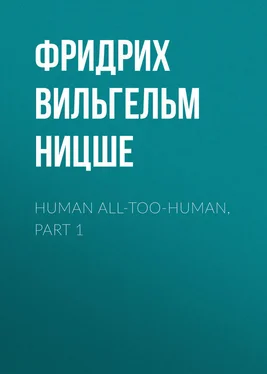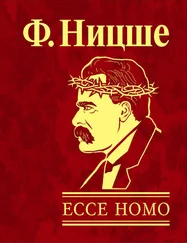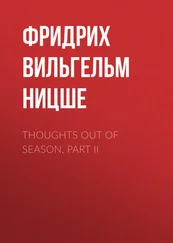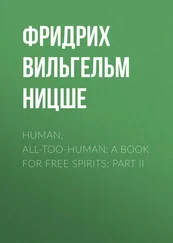Фридрих Ницше - Human All-Too-Human, Part 1
Здесь есть возможность читать онлайн «Фридрих Ницше - Human All-Too-Human, Part 1» — ознакомительный отрывок электронной книги совершенно бесплатно, а после прочтения отрывка купить полную версию. В некоторых случаях можно слушать аудио, скачать через торрент в формате fb2 и присутствует краткое содержание. Жанр: Философия, literature_19, foreign_antique, foreign_prose, на английском языке. Описание произведения, (предисловие) а так же отзывы посетителей доступны на портале библиотеки ЛибКат.
- Название:Human All-Too-Human, Part 1
- Автор:
- Жанр:
- Год:неизвестен
- ISBN:нет данных
- Рейтинг книги:4 / 5. Голосов: 1
-
Избранное:Добавить в избранное
- Отзывы:
-
Ваша оценка:
- 80
- 1
- 2
- 3
- 4
- 5
Human All-Too-Human, Part 1: краткое содержание, описание и аннотация
Предлагаем к чтению аннотацию, описание, краткое содержание или предисловие (зависит от того, что написал сам автор книги «Human All-Too-Human, Part 1»). Если вы не нашли необходимую информацию о книге — напишите в комментариях, мы постараемся отыскать её.
Human All-Too-Human, Part 1 — читать онлайн ознакомительный отрывок
Ниже представлен текст книги, разбитый по страницам. Система сохранения места последней прочитанной страницы, позволяет с удобством читать онлайн бесплатно книгу «Human All-Too-Human, Part 1», без необходимости каждый раз заново искать на чём Вы остановились. Поставьте закладку, и сможете в любой момент перейти на страницу, на которой закончили чтение.
Интервал:
Закладка:
A step further towards recovery, and the free spirit again draws near to life; slowly, it is true, and almost stubbornly, almost distrustfully. Again it grows warmer around him, and, as it were, yellower; feeling and sympathy gain depth,. thawing winds of every kind pass lightly over him. He almost feels as if his eyes were now first opened to what is near. He marvels and is still; where has he been? The near and nearest things, how changed they appear to him! What a bloom and magic they have acquired meanwhile! He looks back gratefully, – grateful to his wandering, his austerity and self-estrangement, his far-sightedness and his bird-like flights in cold heights. What a good thing that he did not always stay "at home," "by himself," like a sensitive, stupid tenderling. He has been beside himself, there is no doubt. He now sees himself for the first time, – and what surprises he feels thereby! What thrills unexperienced hitherto! What joy even in the weariness, in the old illness, in the relapses of the convalescent! How he likes to sit still and suffer, to practise patience, to lie in the sun! Who is as familiar as he with the joy of winter, with the patch of sunshine upon the wall! They are the most grateful animals in the world, and also the most unassuming, these lizards of convalescents with their faces half-turned towards life once more: – there are those amongst them who never let a day pass without hanging a little hymn of praise on its trailing fringe. And, speaking seriously, it is a radical cure for all pessimism (the well-known disease of old idealists and falsehood-mongers) to become ill after the manner of these free spirits, to remain ill a good while, and then grow well (I mean "better") for a still longer period. It is wisdom, practical wisdom, to prescribe even health for one's self for a long time only in small doses.
About this time it may at last happen, under the sudden illuminations of still disturbed and changing health, that the enigma of that great emancipation begins to reveal itself to the free, and ever freer, spirit, – that enigma which had hitherto lain obscure, questionable, and almost intangible, in his memory. If for a long time he scarcely dared to ask himself, "Why so apart? So alone? denying everything that I revered? denying reverence itself? Why this hatred, this suspicion, this severity towards my own virtues?" – he now dares and asks the questions aloud, and already hears something like an answer to them – "Thou shouldst become master over thyself and master also of thine own virtues. Formerly they were thy masters; but they are only entitled to be thy tools amongst other tools. Thou shouldst obtain power over thy pro and contra, and learn how to put them forth and withdraw them again in accordance with thy higher purpose. Thou shouldst learn how to take the proper perspective of every valuation – the shifting, distortion, and apparent teleology of the horizons and everything that belongs to perspective; also the amount of stupidity which opposite values involve, and all the intellectual loss with which every pro and every contra has to be paid for. Thou shouldst learn how much necessary injustice there is in every for and against, injustice as inseparable from life, and life itself as conditioned by the perspective and its injustice. Above all thou shouldst see clearly where the injustice is always greatest: – namely, where life has developed most punily, restrictedly, necessitously, and incipiently, and yet cannot help regarding itself as the purpose and standard of things, and for the sake of self-preservation, secretly, basely, and continuously wasting away and calling in question the higher, greater, and richer, – thou shouldst see clearly the problem of gradation of rank, and how power and right and amplitude of perspective grow up together. Thou shouldst – " But enough; the free spirit knows henceforth which "thou shalt" he has obeyed, and also what he can now do, what he only now — may do …
Thus doth the free spirit answer himself with regard to the riddle of emancipation, and ends therewith, while he generalises his case, in order thus to decide with regard to his experience. "As it has happened to me ," he says to himself, "so must it happen to every one in whom a mission seeks to embody itself and to 'come into the world.'" The secret power and necessity of this mission will operate in and upon the destined individuals like an unconscious pregnancy, – long before they have had the mission itself in view and have known its name. Our destiny rules over us, even when we are not yet aware of it; it is the future that makes laws for our to-day. Granted that it is the problem of the gradations of rank, of which we may say that it is our problem, we free spirits; now only in the midday of our life do we first understand what preparations, detours, tests, experiments, and disguises the problem needed, before it was permitted to rise before us, and how we had first to experience the most manifold and opposing conditions of distress and happiness in soul and body, as adventurers and circumnavigators of the inner world called "man," as surveyors of all the "higher" and the "one-above-another," also called "man" – penetrating everywhere, almost without fear, rejecting nothing, losing nothing, tasting everything, cleansing everything from all that is accidental, and, as it were, sifting it out – until at last we could say, we free spirits, "Here – a new problem! Here a long ladder, the rungs of which we ourselves have sat upon and mounted, – which we ourselves at some time have been ! Here a higher place, a lower place, an under-us, an immeasurably long order, a hierarchy which we see; here — our problem!"
No psychologist or augur will be in doubt for a moment as to what stage of the development just described the following book belongs (or is assigned to). But where are these psychologists nowadays? In France, certainly; perhaps in Russia; assuredly not in Germany. Reasons are not lacking why the present-day Germans could still even count this as an honour to them – bad enough, surely, for one who in this respect is un-German in disposition and constitution! This German book, which has been able to find readers in a wide circle of countries and nations – it has been about ten years going its rounds – and must understand some sort of music and piping art, by means of which even coy foreign ears are seduced into listening, – it is precisely in Germany that this book has been most negligently read, and worst listened to; what is the reason?" It demands too much, "I have been told," it appeals to men free from the pressure of coarse duties, it wants refined and fastidious senses, it needs superfluity – superfluity of time, of clearness of sky and heart, of otium in the boldest sense of the term: – purely good things, which we Germans of to-day do not possess and therefore cannot give." After such a polite answer my philosophy advises me to be silent and not to question further; besides, in certain cases, as the proverb points out, one only remains a philosopher by being – silent. 3 3 An allusion to the mediæval Latin distich: O si tacuisses,Philosophus mansisses. – J.M.K.
FIRST DIVISION
FIRST AND LAST THINGS
Chemistry of Ideas and Sensations. – Philosophical problems adopt in almost all matters the same form of question as they did two thousand years ago; how can anything spring from its opposite? for instance, reason out of unreason, the sentient out of the dead, logic out of unlogic, disinterested contemplation out of covetous willing, life for others out of egoism, truth out of error? Metaphysical philosophy has helped itself over those difficulties hitherto by denying the origin of one thing in another, and assuming a miraculous origin for more highly valued things, immediately out of the kernel and essence of the "thing in itself." Historical philosophy, on the contrary, which is no longer to be thought of as separate from physical science, the youngest of all philosophical methods, has ascertained in single cases (and presumably this will happen in everything) that there are no opposites except in the usual exaggeration of the popular or metaphysical point of view, and that an error of reason lies at the bottom of the opposition: according to this explanation, strictly understood, there is neither an unegoistical action nor an entirely disinterested point of view, they are both only sublimations in which the fundamental element appears almost evaporated, and is only to be discovered by the closest observation. All that we require, and which can only be given us by the present advance of the single sciences, is a chemistry of the moral, religious, æsthetic ideas and sentiments, as also of those emotions which we experience in ourselves both in the great and in the small phases of social and intellectual intercourse, and even in solitude; but what if this chemistry should result in the fact that also in this case the most beautiful colours have been obtained from base, even despised materials? Would many be inclined to pursue such examinations? Humanity likes to put all questions as to origin and beginning out of its mind; must one not be almost dehumanised to feel a contrary tendency in one's self?
Читать дальшеИнтервал:
Закладка:
Похожие книги на «Human All-Too-Human, Part 1»
Представляем Вашему вниманию похожие книги на «Human All-Too-Human, Part 1» списком для выбора. Мы отобрали схожую по названию и смыслу литературу в надежде предоставить читателям больше вариантов отыскать новые, интересные, ещё непрочитанные произведения.
Обсуждение, отзывы о книге «Human All-Too-Human, Part 1» и просто собственные мнения читателей. Оставьте ваши комментарии, напишите, что Вы думаете о произведении, его смысле или главных героях. Укажите что конкретно понравилось, а что нет, и почему Вы так считаете.












